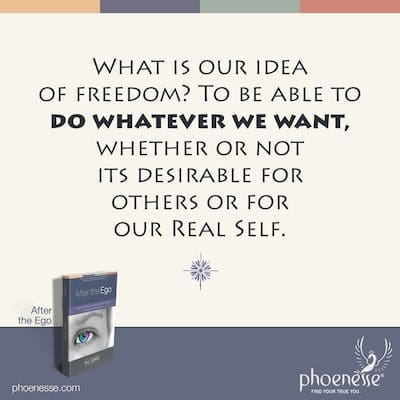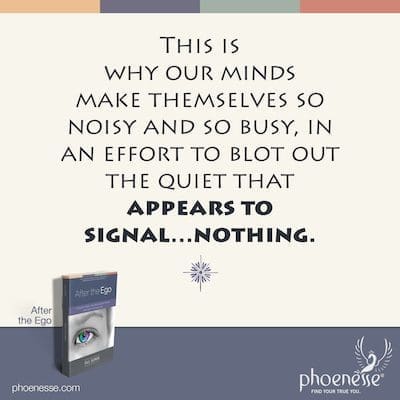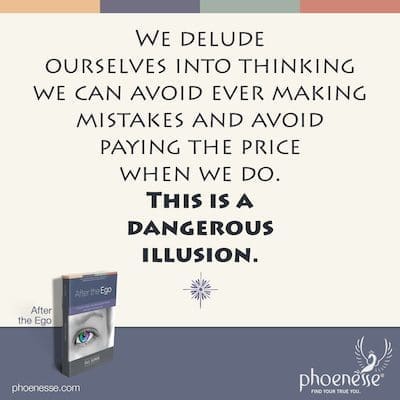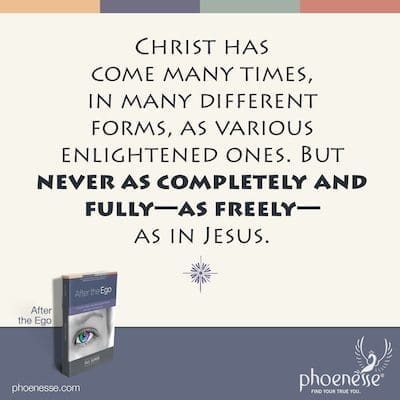At this point in time, many people are as comfortable with the term “inner space” as they are with outer space. But most people think of inner space as merely a symbol of a person’s state of mind. This is not the case. Inner space is actually a real world—a vast reality. This in fact is the real universe and outer space is a mirror image of it—a reflection. This is the reason we can never quite grasp outer reality. We can’t be truly absorb, experience and understand life when we only view it from the outside. That’s why life is so frustrating—and often so frightening—for so many.
It’s not easy to understand how it’s possible that inner space could in itself be a world—the world. The difficulty lies in the limited time/space continuum of our three-dimensional reality. We perceive everything we touch, see and experience from a limited perspective. Our minds are conditioned to perceive things a certain way and at this juncture, we’re not capable of perceiving life another way. But that doesn’t mean our current way is the right way, the only way, or complete way.
“My beloved friends, you are blessed in body, soul and spirit. Your path is blessed every step of the way. You may at times doubt this when the going gets rough. But when this is so, it is not because blessings are withheld from you. It is because you encounter parts of your inner landscape that need to be successfully traversed. To traverse difficult inner terrains it is necessary to understand its meaning for your own being and thus to dissolve the roadblocks you find on your way.”
–The Pathwork Guide
The goal of any spiritual path is to perceive life in a way that goes beyond the outer reflection. Our aim is to focus on the new dimensions we discover in inner space. In some spiritual disciplines, this may be clearly stated as the intention, and in others it might never be mentioned as such.

But when we reach a certain point of development on our path of purification, a new vision wakes up, sometimes gradually and sometimes more suddenly. Even when it seems to happen suddenly, this is only an illusion. All awakening happens as a result of taking many steps on a spiritual path and fighting many inner battles.
Scientists have discovered that each atom is duplicated in the outer universe, as we know it. This is an important recognition. As we have come to understand, time is a variable that depends on the dimension from which it is experienced. It’s the same for space. In the same way that there isn’t an objective, fixed time, there isn’t an objective, fixed space. So our real being can live, move and breathe—and cross vast distances—within an atom, according to our outer system of measurement.
Just as the relationship to time changes in different dimensions, the relationship of measurement changes when a spirit withdraws into the inner world. This explains why we seem to lose contact with what we call “dead” people. Our awareness changes because they now live in the inner reality, which for us, can only be an abstract idea. And yet the thing that is really abstract is outer space.
When a person dies, the spirit—that which is alive—does not go to heaven, as we erroneously assume, but rather withdraws into the inner world. Our spirit does not lift out of the body and float into outer space. When someone with extrasensory perception sees something like this, what they are seeing is only the mirror image of an event that is happening in the inner landscape.
For a long time, a majority of humans have been looking for God up in heaven. Then Jesus Christ came and tried to teach us that we must look for God within, because God lives in the inner spaces. As such, all meditation exercises and practices guide us to focus on inner space.
In a previous teaching, we talked about the value of a meditation exercise in which we don’t think. We simply make ourselves empty. Most who try this find how difficult it is to do this. The human mind is often completely full with its own material, and so it can be very difficult to still the mind. There are several approaches we can take. In Eastern religion, the approach usually involves long practices and lots of discipline. If we combine this with solitude and sitting still, we may eventually produce a state of inner stillness.
But on this spiritual path, we take a different approach. The goal of these teachings is not to take us out of our world. Our goal is actually the exact opposite: We want to be in our world, in the very best possible way. We want to create by understanding and accepting in a way that is productive and constructive.
We will only be able to do this when we fully and truly know and understand ourselves. To do this, we have to traverse the difficult inner spaces, but doing so will make us better equipped to function in this three-dimensional reality. For then there won’t be a split between our inner space and our outer world.
Our perception of outer truth will increase the more inner truth reigns. We will understand the outer world when our understanding of our inner selves grows. We will be able to restructure—to transform—our outer life as soon as we learn to re-mold whatever is in us that is imperfect, or faulty.
Our vision will expand and we will have a greater appreciation of the beauty of creation when we are able to see our inner beauty as a manifestation of the divine. We will become at peace in this world to whatever extent we find inner peace. This will be true, even in the presence of life’s difficulties.
In other words, we don’t need to find a secluded mountaintop to reach inner space. On this path, we take a different route to reach our destination. We go directly through whatever seems to be our biggest obstruction: the imperfections within us and around us. By approaching them, we deal with them, until they lose their fearsome roar. This is our path.

Focused emptiness
While it can be a helpful exercise to sit and focus on inner emptiness, that must not be our sole approach to self-realization. Likewise, dealing with outer troubles in our world must never be our only approach to our own salvation or the salvation of this world.
Focused emptiness will grow—spontaneously and deliberately—as we face and remove our inner obstacles. In the early stages, we are going to have to be with the experience of nothingness and emptiness. For when our mind quiets, we first encounter the void, and this is what makes the attempt so frightening. It seems to confirm our suspicion that we are indeed only our outer mortal self, and there’s nothing inside.
This is why our minds make themselves so noisy and so busy, in an effort to blot out the quiet that appears to signal…nothing. Here again we will need courage to go all the way through this tunnel of uncertainty. We must take the risk of being in this great quietude, which at first seems devoid of anything that spells consciousness, and which seems empty of meaning.
Many people have experienced how the voice of our inner God—our Higher Self—slips inspirations into our mind when we least think of it. It doesn’t happen during meditation or prayer, or even right after. Often, it waits until our mind is relaxed enough and free enough from self-will for the inner voice to be heard. It works the same way when it comes to experiencing the inner universe, which is the real world.
Focused emptiness allows what was hidden to emerge. This includes errors, distortions, and other Lower Self material. Eventually, it will bring us in touch with the reality of our Higher Self and the vast, eternal world where it dwells. As such, focused emptiness connects us with all levels of our being. We will need to travel through many stages and phases. We can only reach the later stages after we’ve accomplished a certain amount of purification and integration.
So whereas focused emptiness is a heightening of our consciousness, unfocused emptiness is a lessening of our consciousness. When we are unfocused, we tune out and our mind wanders vaguely. This may lead us to mindless emptiness. The final stages of this are sleep or other states of unconsciousness. By contrast, in focused emptiness we are fully there—aware and concentrating.
If we focus exclusively on our inner world—at the exclusion of our outer world—we create a split. Worse, we forfeit the whole reason we incarnated. For how can we complete our task—whatever it is—if we don’t use our outer world for this purpose? If it wasn’t necessary for us to have come to this dimension, we wouldn’t have come here.
So we need to make use of our time here, bringing our inner and outer conditions into a healthy, meaningful relationship with each other. And that is just what we learn to do on this path. All our experiences in life relate to our personality—to all the various levels of ourselves. It is always the inner being that creates the outer conditions, a truth we quickly come to see as we start doing our work.
If we are not regularly relating our inner world to our outer life, this will create an imbalance, and the result won’t be good. For example, sometimes we see people who are doing a lot of outer good work lose their way as easily as those who don’t give other people a second thought. This happens because our outer good intentions and good works must arise from an inner focus if we want to avoid creating disharmony and a dangerous split in our personality.
Through focused emptiness we eventually arrive in the eternal light. If we are willing to oversimplify things, we can say there are basic stages we will go through. Note, in practice these stages will overlap and not happen in neat succession as outlined here for the purpose of clarifying the work.
- We will experience the busyness and noise of our mind.
- As we quiet the noise, we will encounter nothingness, emptiness.
- We will start to see connections between aspects of our inner self and our outer experiences. With our new understandings about levels of ourselves we haven’t recognized before, new Lower Self material will appear. This is not merely an experience of Lower Self—this is a ray of divine guidance. For recognizing the Lower Self is always a manifestation of guidance from our Higher Self.
- Higher Self messages will begin to manifest directly. We could also say our channel opens. In this way, we will now receive encouragement, advice and other words intended to bolster our courage and give us faith. In this phase, divine guidance is operating mostly through our mind. This isn’t necessarily a totally emotional and spiritual experience. We may be excited and gladdened by it, but we are reacting as a result of our mind receiving knowledge it has absorbed and found convincing.
- In this final stage, we have a direct and total experience that is spiritual and emotional. Our whole being becomes filled with the Holy Spirit. Now we know, not through our mind, but through our whole being. When we know something through our mind, the knowledge is indirect. It has been relayed to us. This is the human mind we need to function on this level of consciousness. Direct knowing is different.
The final phase has many stages within it. For there are limitless possibilities—truly infinite possibilities—in how we can experience the real world. One of them is simply total knowing, which reaches every fiber of our being and every level of our consciousness. We can also experience the real world through visions of other dimensions, but they are never just about what we see. A total experience will always affect the whole person.
Every sense perception is total in the real world, unlike what we experience in our fragmented world. So seeing isn’t only seeing, it’s also hearing, feeling, smelling and tasting—plus many perceptions we know nothing about on this level of being—all rolled into one. In this fifth stage, knowing, feeling and perceiving are bundled with hearing and seeing, in one all-inclusive package. Every capacity God has created is included. We can’t even imagine the limitless possibilities—not to mention the richness and variety—of having all these capacities.
The ideal state to be in to be filled by the Holy Spirit is focused emptiness. What is the Holy Spirit? It is the whole world of God, in all its glory and magnificence. We don’t have words in the human language adequate to convey it. It’s not possible to describe what exists beyond the bounds of fear, distrust and doubt, after we overcome death, evil and suffering. But we can reach all the splendor and fullness of the Spirit World by crossing over the threshold of focused emptiness.
Practicing focused emptiness
Many begin a practice, such as the practice of focused emptiness, with the expectation of immediate results. In fact what’s really necessary is to have no expectations at all. For expectations create tensions that prevent the inner and outer relaxation we are looking for. What’s more, expectations are unrealistic. It may take us many incarnations to reach the fifth stage. So rather than set ourselves up for disappointment—which can set off chain reactions of other negative emotions like fear, doubt and discouragement—it is better to let go of any and all expectations.
In our work, we want to infuse patience, humility and awe into our approach at each stage. For these experiences will open us up to vast inner space. Many worlds, universes and spheres exist, with unending mountains, seas and plains. We need to know that these inner spaces are not abstract or symbolic. They are more real than the outer, objectified world so many believe to be the only reality.
In inner space, measurement is not the same as here in the outer world. There is a different relativity between measurement and time/space/movement. If we can even capture a vague or hazy sense of this, it will change our outlook and help us go further on our path. We don’t need to sit for hours and hours practicing focused emptiness. That’s not the point of it. But each time we pray and meditate, we can attempt it to some degree.
So what is the main point? We want to reach autonomy, in every sense of the word. Everything in life depends on our ability to respect ourselves and discover our values. So we must discover our capacity for loving and reach the fulfillment we long for. To do this, we need to fulfill the task we agreed to when we decided to incarnate.
We also want to experience God living in us and all around us. And we need to develop the ability to be a true leader as well as a follower. Last but not least, we want to develop the ability to let go of our mind and find the inner space that is our real home. For only by finding our true inner home can we find eternal life. This is the only way to remove all our fears, forever.

Taking self-responsibility
We can’t surrender to God’s will until we are in full possession of ourselves. At the same time, we can’t find and be all of ourselves unless we surrender to God unconditionally. To resolve this paradox, it’s important we look at our resistance to reaching the all-important state of autonomy.
Too often, what we really crave is an authority figure who is going to take over for us when life becomes hazardous; when we have to pay the price for our mistakes; when we have to experience the conditions we created with our imperfections. So many people crave a “perfect life” where we don’t have to deal with any of that. We delude ourselves into thinking we can avoid ever making mistakes and avoid paying the price when we do. This is a dangerous illusion, made especially so because it’s so subtle we can easily gloss over it. By rationalizing it, we are able to deny it.
If we feel confused about ourselves, our lives, or by what’s happening around us, this is a sign we’re suffering from this delusion and are deliberately avoiding growing up. If we are rebelling against authority figures, this is a sign we’re still craving the “right” authority. We want a super-person to come protect us from the troubles of life, so we don’t have to experience our reality. When we are autonomous though, we no longer need to rebel against authority. We are no longer in confusion. Then we can clearly see what’s true and what is not true, so we can decide to agree or not agree. We don’t need to resort to rebellion or fearful submission.
So how do we get there? What is the road to clarity and the ability to make good decisions? We must become willing to probe, search, question, explore and be open. Following such a course requires patience to sort out the issues in our life. There are no quick, ready-made answers.
The dependent, childish person abhors being patient and doesn’t want to work to find out more, because that means work. The dependent, childish person wants easy answers and is quick to jump to conclusions. When we’re afraid to make a mistake, we don’t question our hasty conclusions. Instead, we stiffly insist we are right and this bars the door to truth and clarity. The result? Inner confusion, which breeds confusing experiences. If we can’t connect the dots and see how we have created these negative, confusing experiences, then life will appear unfair and too hard. So then we demand a perfect authority to come put things right.
But the more loudly we claim we want to be independent, the more suspect our real intentions are. The more we feel the need to prove we’re a free agent and can’t be influenced, the more likely it is we’re running away from real autonomy. The truth is, we’re not willing to take full responsibility for our decisions, our experiences, or our life.
The bigger our rebellion against those in authority whom we say are denying us our rights, the more we secretly resent them for not living up to our impossible demands. And what are those demands? That we not have to make mistakes and pay any price for them; that we not have to deal with the consequences of our errors, unwise decisions, negativities or distortions. We want to be given an infallible key that grants us this kind of magic, and allows us to remain free forever.
What is our idea of freedom? To be able to do whatever we want, whether or not its desirable for others or for our Real Self. We never want frustration or discipline. When we aren’t able to reach these goals, we blame authority figures and then resent them. Then we accuse them of doing the opposite of what we expect them to do. To be more specific, we blame them for blocking our freedom by setting limits. We refuse to see that these are life’s laws—these are the limitations of reality. Then we deliberately, albeit unconsciously, create confusion by distorting the limitations as though having boundaries means we’re enslaved.
We must start to see how and to what extent we are showing up in life like this. Then we need to ask ourselves some seriously probing questions. Am I willing to assume self-responsibility, with all this requires? Can I accept that I am still imperfect, and that I am going to make mistakes? When I do, am I willing to pay the price for them? The more willing we are to pay the price, the lower the price will be. In fact, the price will turn into a stepping stone, a necessary lesson, a threshold.
We can gain the strength to walk this path only from our willingness to surrender to God’s will. Then we will be able to truly stand in the middle of life as it unfolds around us, not denying it, not fleeing from it, and never using spirituality as a way to escape from it.
When our surrender to God is genuine, all dualistic confusion will dissolve and we will be able to step into full autonomy. By following through on our path, we will clear up any confusion about becoming an individual versus being a member of a community. We won’t be confused about self-surrender versus real independence. For true selfhood allows us to become a social being who is at peace with our surroundings. We will learn how to be intimately connected with others and always contribute to them.
When we become a truly autonomous person, we can be a strong leader and also a willing follower, because our vision will be clear and our being will be centered in divine reality.
The thing that most prevents us from walking through these gateways is that we want to avoid full self-responsibility. We aren’t willing to be accountable. Our freedom is directly dependent on this. Our ability to let go in strength, not weakness, depends on this.
Of course autonomy, like so many things, is a question of degree. Some people are able to stand on their own two feet when it comes to earning a living. We may even do so in a way we generally enjoy. In this area of our life, we may be able to accept that there will be challenges to face, there may be boredom or strife. During difficult times, we’re willing to give our best. And this is precisely why we are able to enjoy our work and be successful.
But there may be other areas, perhaps less noticeable, where we still depend on others and won’t be our own self. Our work is to explore these areas. A few telltale signs are whether we can distinguish between those we can trust and those we can’t, and how we feel about authority figures in our life. Then where do our intense feelings go? It’s entirely possible we aim our positive feelings toward those who are not to be trusted, while viewing with suspicion the people who are encouraging our autonomy and who deserve our trust.
If we are not able to trust ourselves, we will never be able to sort out who is trustworthy. And why can’t we trust ourselves? Because we don’t know which parts of ourselves deserve our trust. Too often, we insist the childish part—the most shortsighted, destructive part—is the part of ourselves that’s most independent. We like to believe that doing what feels most pleasurable in the moment and always following the line of least resistance amounts to autonomy. It might be so on occasion, but it most certainly is not always so.
We can only trust ourselves if we have learned to listen for the voice of the true inner authority. That’s the one capable of saying no to instant gratification because in the long run that defeats us. To live a healthy, full, satisfying life, we must step into true maturity. This is what creates the underpinning for spiritual self-realization. Without maturity, our spirituality will sooner or later twist into a distortion, no matter how good our intentions were starting out.
On the other hand, it’s not possible to reach full independence and health by way of only psychological means. To reach our goals, we will need to learn that there are several different voices inside to listen to. We will need to learn which voices to trust and which to reject. We will need to explore all there is to uncover within, or our goals will remain elusive and all this a beautiful theory.
At the beginning, the voice of the Higher Self will be the hardest to hear. Yet this is the voice we must listen to more than all the loud clamoring of the other voice—the one that never wants to tolerate any frustration.
The only way for a community to become autonomous, safe and creative as a group entity is for the members of the community to gain autonomy. In the new era we are now entering, everything will tend to move in this direction. To whatever degree individuals develop—reaching emotional, mental and spiritual maturity—whole societies can be transformed.
When the overall attitude of a society reaches this state, then even those who come from the lowest spheres—with spiritual ignorance or a destructive intent—will not be able to wreak havoc on Earth. Their negative influence will melt away like snow in the sun. This is not the case now. Too many people hanker after leaders who will allow everything and not forbid anything, and who make promises about taking away the hardships of living.
Only when people step into true autonomy will they be able to have deep, realistic, intense contact with the Christ consciousness in an extended way. If we remain immature, the road will be blocked, the voices confusing, and the experience inaccessible. Then the idea of surrendering to God seems confusing. For the wish to surrender to false authority—someone who permits everything, sets no limits about following the line of least resistance, imposes no frustrations, and offers this kind of utopia—creates a fear in us. For in our inner being we know the dangers of such a surrender.
As it says in the Bible, the weaker ones will surrender to false prophets. When we are in an unfinished state in our development—only partially striving for autonomy—we will fear all forms of surrender. What we really fear and distrust is our own desire for a false prophet who will promise what they should never promise.
These promises may not be stated in so many words, but they are implied in the messages being communicated. These messages connect with the consciousness of those who are most vulnerable due to how unwilling they are to take responsibility for their own lives.
What this all boils down to is that no matter how willing we may be to surrender to God’s will—desiring God’s guidance in whatever form it might be given to us—our resistance to surrendering cannot be overcome if we are not able to take responsibility for all aspects of our being.
From the point of view of evolution, spirit can penetrate into matter to whatever degree spiritual laws are followed and truth is found. A person’s level of self-responsibility is the key. More spirit can be born into flesh—more life can penetrate matter—when our spiritual self grows stronger.
As more of our real being is born into our body, talents may come to the foreground we knew nothing of before. Suddenly a new wisdom may manifest, a new understanding may unfold, a new capacity to feel and love may arise. All these things come from our Real Self that lives in the inner space. That is the real world.
As we make room for these aspects to push into the life of matter, we will be fulfilling our part in the scheme of evolution. These divine attitudes can’t grow in us from the outside. They cannot be added onto us. They only can blossom in our outer world when we make room for our inner being, which has yet to fully manifest.
This is what happens as a result of our growth process, when we undertake the hard work we must do on this path. After we have made some headway in our development, our progress will be helped along by our focus on inner emptiness. We must discover that the emptiness is an illusion. The truth we will discover is a fullness—a rich world filled with glory. If we tap into it, we can receive everything we need from this inner source and translate it into our outer experience.

Live a spiritual life
Throughout the ages, Christ has come many times, in many different forms, as various enlightened ones. But he has never come as completely and fully—as freely—as in Jesus. So here too it is a question of the degree to which spirit flows into matter. The maximum of spirit, of life and of consciousness can only manifest in matter that is unobstructed.
Eventually we will reach the point in our evolution on this sphere—on this planet we call Earth—when matter will yield to spirit so completely that matter will be totally spiritualized. Matter will then no longer be an obstruction to spirit. We will have completely filled the void with life.
There is no aspect of our personality that is insignificant in terms of evolution and creation. There is no such thing as a “merely psychological aspect.” Every thought, every feeling, every attitude, every reaction, reflects how much we can participate in the greatness of life. When we know this, we will find it easier to give ourselves completely to doing this work. We will learn how to unify every duality, so our spiritual life and our worldly life become one.
“Make room for unobstructed life, for unencumbered spirit! Let it fill every part of your being so that you will finally know who you really are. You are all blessed, my very dearest ones.”
–The Pathwork Guide

Return to After the Ego Contents
Read Blinded by Fear
Read Original Pathwork Lecture #256: Inner Space, Focused Emptiness


